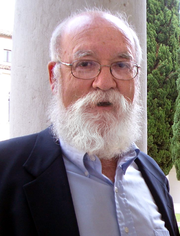- 22 Jul 2007 20:07
#1274710

Is that so?
Yes, it might be weird if you are a non-physicalist, but as you mentioned Block is a physicalist(in some sense) and thinks that the term consciousness is a term that refers to something* that the brain does(and the brain being entierly physical). He thought that people often confused the use of consciousness to mean 'awareness' with meaning 'phenomenality'. That is, the difference between prossessing information without phenomenal properties and getting information from experience, as I understand it. I might mention that he is also a 'friend of qualia', but believes that it is a physical aspect of the brain(at least I think he does, non-reductive physicalism and all that).
Solving the problem with identity with the whole causal-chain description of identity is a bit so-so. I guess it is possible but then there wouldn't be any difference between the two selves in the original example(given a functional identification of consciousness), which seems a bit counter-intuitive(but not impossible). I am more optimistic at a solution through linguistical critique.
* two things actually

Is that so?
Yes, it might be weird if you are a non-physicalist, but as you mentioned Block is a physicalist(in some sense) and thinks that the term consciousness is a term that refers to something* that the brain does(and the brain being entierly physical). He thought that people often confused the use of consciousness to mean 'awareness' with meaning 'phenomenality'. That is, the difference between prossessing information without phenomenal properties and getting information from experience, as I understand it. I might mention that he is also a 'friend of qualia', but believes that it is a physical aspect of the brain(at least I think he does, non-reductive physicalism and all that).
Solving the problem with identity with the whole causal-chain description of identity is a bit so-so. I guess it is possible but then there wouldn't be any difference between the two selves in the original example(given a functional identification of consciousness), which seems a bit counter-intuitive(but not impossible). I am more optimistic at a solution through linguistical critique.
* two things actually
















 - By wat0n
- By wat0n